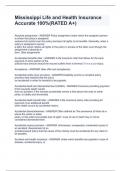-
1. Exam (elaborations) - Mississippi real estate exam correct questions & answers(rated a+)
-
2. Exam (elaborations) - Real estate exam review test mississippi correct questions & answers.
-
3. Exam (elaborations) - Mississippi real estate questions & answers(rated a+)
-
4. Exam (elaborations) - Ms real estate state complete questions & answers(rated a+)
-
5. Exam (elaborations) - Mississippi real estate questions & answers(graded a+)
-
6. Exam (elaborations) - Mississippi real estate exam| 195 questions| complete answers.
-
7. Exam (elaborations) - Ms real estate mississippi practice exam correct 100%(rated a+)
-
8. Exam (elaborations) - Ms state real estate exam correct questions & answers(rated a+)
-
9. Exam (elaborations) - Mississippi real estate license law correct 100%(rated a+)
-
10. Exam (elaborations) - Mississippi state real estate correct questions & answers(rated a+)
-
11. Exam (elaborations) - Mississippi real online real estate terms - unit 1 correct 100%(rated a+)
-
12. Exam (elaborations) - Mississippi real estate test (2024 latest update)correct 100%(rated a+)
-
13. Exam (elaborations) - Real estate law- mississippi correct questions & answers.
-
14. Exam (elaborations) - Principles of real estate test mississippi state correct 100%(rated a+)
-
15. Exam (elaborations) - Real estate ms section| 65 questions| correct answers(rated a+)
-
16. Exam (elaborations) - Mississippi real estate license law & national license math accurate 100%
-
17. Exam (elaborations) - Ms real estate exam correct 100%(rated a+)
-
18. Exam (elaborations) - Ms real estate salesperson exam 100% verified!
-
19. Exam (elaborations) - The mississippi real estate commission accurate 100%.
-
20. Exam (elaborations) - Mississippi real estate principles v5.0 correct 100%(rated a+)
-
21. Exam (elaborations) - Mississippi realtor institute test correct questions & answers.
-
22. Exam (elaborations) - Mississippi real estate review correct 100%(rated a+)
-
23. Exam (elaborations) - Mississippi real estate law correct questions & answers!
-
24. Exam (elaborations) - State specific portion real estate exam 25 accurate 100%(graded a+)
-
25. Exam (elaborations) - Ms real estate psi exam study guide accurate 100%(rated a+)
-
26. Exam (elaborations) - Real estate - state chapter tests accurate 100%(rated a+)
-
27. Exam (elaborations) - Mississippi real estate unit 2 correct questions & answers!
-
28. Exam (elaborations) - Ms state exam correct questions & answers(rated a+)
-
29. Exam (elaborations) - Mississippi real estate license law completely solved!
-
30. Exam (elaborations) - Mississippi real estate unit 1: introduction to the real estate business correct 100%...
-
31. Exam (elaborations) - Mississippi real estate unit 7:title transfer accurate 100%(graded a+)
-
32. Exam (elaborations) - Mississippi life and health insurance accurate 100%(rated a+)
-
33. Exam (elaborations) - Ms life and health insurance test correct questions & answers(rated a+)
-
34. Exam (elaborations) - Mississippi health and life insurance| 200 questions| correct answers.
-
35. Exam (elaborations) - Mississippi life and health insurance questions & answers(rated a+)
-
36. Exam (elaborations) - Mississippi life and health final exam| 150 questions| correct answers| verified.
-
37. Exam (elaborations) - Mississippi life and health final exam 109-150 accurate 100%(rated a+)
-
38. Exam (elaborations) - Mississippi life producer exam correct questions & answers!
-
39. Exam (elaborations) - Life accident and health insurance mississippi 2 correct 100%(rated a+)
-
40. Exam (elaborations) - Ms health and life insurance exam chapter 14 accurate 100%(rated a+)
-
41. Exam (elaborations) - Mississippi insurance test complete questions & answers(graded a+)
-
42. Exam (elaborations) - Mississippi life insurance state exam accurate 100%(rated a+)
-
43. Exam (elaborations) - Mississippi life insurance laws flashcards accurate 100%(graded a+)
-
44. Exam (elaborations) - Mississippi insurance exam correct questions & answers(rated a+)
-
45. Exam (elaborations) - Life, health, & accident practice test | 100 questions| correct 100%(scored a+)
-
46. Exam (elaborations) - Life insurance mississippi correct 100%(rated a+)
-
47. Exam (elaborations) - Mississippi insurance- property and casualty accurate 100%
-
48. Exam (elaborations) - Ms property & casualty questions & answers(rated a)
-
49. Exam (elaborations) - Mississippi insurance laws correct 100%(rated a+)
-
50. Exam (elaborations) - Chapter 8 - mississippi laws & rules pertinent to insurance correct 100%(rated a+)
-
51. Exam (elaborations) - Mississippi life insurance laws correct 100%(rated a+)
-
52. Exam (elaborations) - Ms laws and rules complete questions & answers(rated a+)
-
Show more





